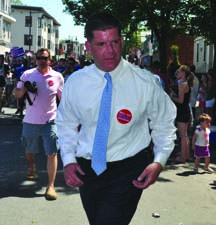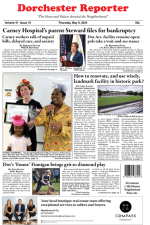May 29, 2014
 Marty Walsh: As a state rep- and mayoral candidate- in last year's Dot Day Parade.A week ahead of Mayor Martin J. Walsh’s first Dorchester Day parade as mayor, the Reporter caught up with him to get his thoughts on his role in the 110-year-old tradition and what he expects to encounter while marching along the 3.2 mile route.
Marty Walsh: As a state rep- and mayoral candidate- in last year's Dot Day Parade.A week ahead of Mayor Martin J. Walsh’s first Dorchester Day parade as mayor, the Reporter caught up with him to get his thoughts on his role in the 110-year-old tradition and what he expects to encounter while marching along the 3.2 mile route.
Q. Since this will be your first Dorchester Day as mayor, what does this mean to you?
A. I’m really excited about it. I’m looking forward to it. I’ve marched in the Dorchester Day parade almost every year since I’ve been in office except the one year when my father died the day before. It’s always a special day for me, so as mayor, it’s probably going to be a little more special.
Q. Anything different that we can expect?
A. Everyone’s working on stuff and I don’t want to ruin the surprise coming, but … we think we actually have a few surprises that might be coming this year.
Q. Oh, boy. Please tell me it’s candy.
A. We could take care of that, too.
Q. People call this the best parade in the city because there’s really no controversy surrounding it compared to other ones. Would you agree?
A. I think with most parades there’s no controversy. With Dorchester Day over the years, the crowd has been sporadic. Hopefully we have a better crowd this year. There’s no controversy, at least, marching down the avenue. Putting it together, there’s always at least a little bit of controversy. Since it’s the first Sunday in June, the Celtics, in their heyday, were always playing in the playoffs and it’s always usually a hot day, which is a great day. It’s a great day for cook- outs and celebration of Dorchester and who we are and what Dorchester means to Massachusetts.
Q. The Parade Committee puts on an essay contest, sponsored by the Dorchester Reporter, for sixth to eighth graders in the neighborhood to submit three specific suggestions on how the mayor can work to make the neighborhood a better place for young people. What do you think they’re going to suggest?
A. I’m sure somebody will want to shorten the school day. I think probably more sports or activities for them to do after school. Probably better food in schools. That might come out as one of the issues.
Q. No Doritos?
A. No Doritos. I’m not sure. It’s hard to say. Probably safety. Sixth to eighth graders are pretty sharp and they’re up on a lot of different things, so that’s probably what they’re going to be looking for.
Q. What are some examples of changes you have made to help these young people.
A. We’ve put a lot more programming in our parks this year. We just kicked off something yesterday in one of the parks where we’re bringing the Fenway Park experience to neighborhoods where we play away games on a camera and we have a Yawkey Way experience for young people with popcorn, hot dogs, and things like that. I think programming in the park is one of the biggest things. We also increased the age on the summer jobs program so we cover a larger number of people–I think it’s 14 to 18 now, where, in the past, it hasn’t been that. And we’re working really hard to make sure that every young kid that wants a summer job gets one.
Q. Last one: If you were a sixth to eighth grader, and could recommend things the mayor should do, what would you suggest?
A. Probably around recreation. Probably fixing the parks up and making sure the parks are what they deserve.


